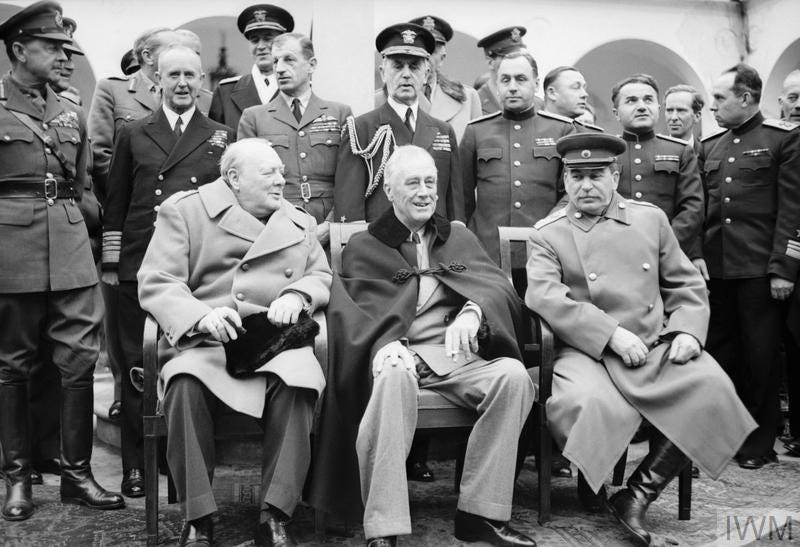Franklin D. Roosevelt Defeated Nazi Germany from a Wheelchair. Joe Biden Is Defeating Russia While Being a Bad Debater.
American presidents aren't athletes. They're leaders.
U.S. president Franklin D. Roosevelt died on April 12, 1945, just three weeks before Nazi Germany surrendered to the allied armies Roosevelt helped to mobilize and lead—and five months before Imperial Japan also surrendered.
Roosevelt, 63 at the time of his death, had been a lifelong chain-smoker. His health had been in decline since before he entered the United States into World War II. In March 1944, doctors diagnosed him with hypertension, atherosclerosis, coronary artery disease and congestive heart failure.
Oh—and he’d had polio in 1921 and was paralyzed from the waist down. But a hemorrhage is what finally killed him.
None of Roosevelt’s health problems prevented him from winning a global war and saving democracy from history’s greatest monsters. None of his health problems prevented him from instituting profound reforms at home, including the New Deal and a successful confrontation with a reactionary Supreme Court.
I’m sure you know where I’m going with all this. If you’re a fascist, a religious extremist or a member of Donald Trump’s Q-Anon cult, you might want to stop reading. But you shouldn’t.
If you’re a responsible American voter and a patriot, please read on—and find your resolve.
Despite a bad debate performance in Atlanta last week, U.S. president Joe Biden is more than capable of leading the United States, and the free world, through the current era of instability, war and accelerating climate change.
At 81, he’s old. But he’s in better health now than Roosevelt ever was as an adult. And while he stutters—a childhood affliction he never entirely overcame—he remains a cogent and determined leader whose policies bolster American democracy and align with America’s traditional role as a defender of freedom and prosperity everywhere.
His opponent in the current presidential election, 78-year-old convicted criminal Donald Trump, who is liable for rape, is determined to end American democracy as well as end America’s traditional role as a global defender of freedom and prosperity.
Leaving aside Biden’s domestic accomplishments—huge infrastructure and climate investments, low unemployment and galloping economic growth—he has waged a masterful campaign in support of Ukraine.
Twenty-eight months into authoritarian Russia’s wider war on democratic Ukraine, the Russians are losing a thousand soldiers every day while advancing yards at a time, if at all. Russia is expending combat power it could take a generation to rebuild, and Ukraine’s American-made weaponry is responsible for much of the destruction.
Pro-Russia Republicans in the U.S. Congress, egged on by Trump, did their best to block U.S aid to Ukraine as the wider war ground into its third year. Leveraging his slim majority in the U.S. House of Representatives, Republican Speaker of the House Mike Johnson—a Louisiana religious extremist—refused to put Biden’s aid bill up for a vote.
That same bill also included aid to Taiwan and Israel, which most Republicans still support. But Trump, who was impeached in 2019 for trying to extort Ukrainian officials for election favors, instructed Johnson to hurt Ukraine—even if that also meant hurting Taiwan and Israel.
Biden held out, carefully and gradually building the case for continued U.S. support of Ukraine’s war of survival. In mid-April, after six months of Republican delay, Johnson finally relented. $61 billion in fresh aid to Ukraine passed Congress with an overwhelming majority of lawmakers in support. Biden promptly signed the aid bill into law.
Enormous batches of American ammunition quickly shipped to Ukraine, leading to a big increase in Russian casualties. An offensive that Russia launched into northern Ukraine in mid-May ground to a bloody halt after just two weeks.
That was Biden’s victory. The accomplishment of a wartime president whose recent debate performance might not be very telegenic, but whose patience, wisdom and staunch defense of freedom and democracy get real, and world-changing, results.
Roosevelt didn’t look like much toward the end of his life. He was pale, frail, tired-looking—and yes, still confined to his wheelchair.
But even then, he was a fierce leader. In March 1945, Soviet dictator Joseph Stalin signaled his intention to break the terms of the Allies’ Yalta Conference agreement—which, among other things, provided for free elections in liberated countries in the Soviet periphery.
The president firmly rejected Stalin’s position. It was one of his final acts before dying.
Roosevelt won World War II and prepared to fight the Cold War that would follow, all while in extremely poor health. Biden by contrast is in unusually good health. A physical in February diagnosed him with a chronically phlegmy throat and stiffness owing in part to arthritis following a foot injury. But otherwise, his health is superior to that of many people much younger than him—in particular, his heart rate and lipid levels are low.
But that doesn’t really matter. American presidents are not actors. They are not athletes. They are leaders. Their commitment to American ideals—and their patience, discipline and courage in defending those ideals—matters far, far more than do their gait and their ability to mug in front of cameras. Roosevelt couldn’t even walk, and yet he led.
Biden isn’t an actor. He’s not an athlete—although, it’s worth noting, he exercises in public while Trump does not.
No, Biden is a leader. And a tough one, at that. Practically Rooseveltian, but with the advantage of good health. A vote for Biden is a vote for lawfulness, justice and democracy in America and abroad.
A vote for Trump in the November election is, by contrast, a vote for corruption, criminality and despotism amid a quickening judicial coup by the Republican Supreme Court, which just this week granted Trump broad immunity from criminal prosecution, even for acts of treason.
The choice is an easy one. Stand with Roosevelt. Stand with America. Stand with Biden.





